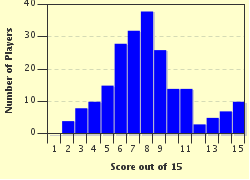Quiz Answer Key and Fun Facts
1. We'll start with a question about New Jersey's Native Americans. What tribe resided in New Jersey before the settlers came in?
2. In what year was the land that became known as New Jersey first discovered by explorers?
3. In what year did explorers first set foot on the shores of New Jersey?
4. What was the name of New Jersey before the English claimed it from the Dutch?
5. We'll jump a little ahead for a question about the Revolutionary War. New Jersey has been nicknamed "The Crossroads of the Revolution" due to the fact that it held a key geographical position at the center of the new nation. True or false: There were 10 battles that were actually fought IN New Jersey.
6. Which two New Jersey towns briefly served as the nation's capital?
7. Which towns served as capitals before Trenton was the final decision in 1784?
8. We now move on to the Civil War era. Was New Jersey important to the abolition of slavery?
9. The demand for supplies in the Civil War continued after the war was over. New Jersey soon was the home to more than a few immigrants. What was the industry that was in the most demand?
10. Now we move to the 20th century. New Jersey has had only one governor who has become president. What was his name?
11. Now some interesting tidbits about New Jersey. We'll begin with baseball. In what year was the first "officially recorded" (under the 20 rules of Alexander Cartwright) baseball game played?
12. One of the most famous kidnapping/murder cases, that of the Lindbergh baby, took place here in New Jersey. In what year did this crime take place?
13. There are more of this animal per square mile than any other state. Name it.
14. What classic novel by Peter Benchley, written in 1975, was inspired by several shark attacks in 1916?
15. What popular board game (American version) uses properties named after streets in Atlantic City?
Source: Author
draculanut31
This quiz was reviewed by FunTrivia editor
bloomsby before going online.
Any errors found in FunTrivia content are routinely corrected through our feedback system.


